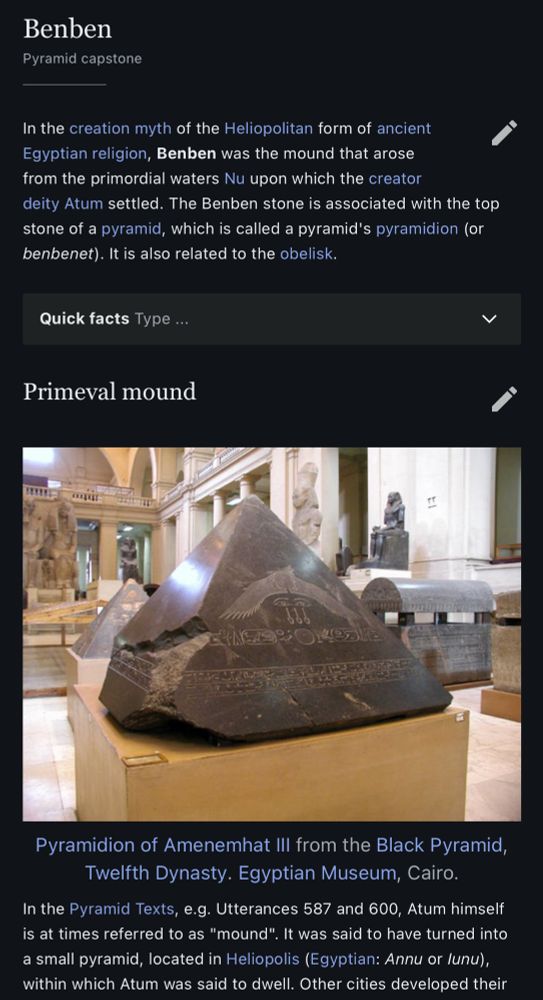
Nothing comes from nothing, and everything is the way it is because it got that way.
How would an -ism,(“ideology, principle, or condition born of”) that was built from this reflexive object pronoun case look like? If this perspective acted as one’s foundational principle, what kind of cognitive biases would it introduce to the user?

How would an -ism,(“ideology, principle, or condition born of”) that was built from this reflexive object pronoun case look like? If this perspective acted as one’s foundational principle, what kind of cognitive biases would it introduce to the user?
Diachronic semantics is constantly evolving, and is always embedded in spacetime.
Diachronic semantics is constantly evolving, and is always embedded in spacetime.
aeon.co/essays/the-l...

aeon.co/essays/the-l...

Extending this to the mind, I want to use Dawkins’ coined concept of the Meme…
Extending this to the mind, I want to use Dawkins’ coined concept of the Meme…


The word eclectic,(“selective”) breaks down into ek,(“out”) + lego/legere. Never thought the meaning of eclectic was specifically referred to words.
Thus, AI circles around something like Constructed Inter-Language. Mathematics. Self-referential. Autological.
The word eclectic,(“selective”) breaks down into ek,(“out”) + lego/legere. Never thought the meaning of eclectic was specifically referred to words.
On a completely unrelated note, of course, the word bourgeoisie is french for burgher (ie. merchant/professional class). It means mountain, related to “iceBERG”.




On a completely unrelated note, of course, the word bourgeoisie is french for burgher (ie. merchant/professional class). It means mountain, related to “iceBERG”.
It removes the BC/AD divide by pushing our chronological timeline back 10,000 years. This reduces cognitive load by removing the calculation, while giving us a wider and interrelated perspective of the human story.
It removes the BC/AD divide by pushing our chronological timeline back 10,000 years. This reduces cognitive load by removing the calculation, while giving us a wider and interrelated perspective of the human story.
If you go up a dimension (n+1):
- cube to 8-cell (ie. a tesseract)
- octahedron to 16-cell
- cuboctahedron/rhombic dodecahedron to 24-cell




If you go up a dimension (n+1):
- cube to 8-cell (ie. a tesseract)
- octahedron to 16-cell
- cuboctahedron/rhombic dodecahedron to 24-cell
If you’re familiar with mathematical duals, it’s akin to this.

If you’re familiar with mathematical duals, it’s akin to this.
When you’re asking pointed questions of someone, remember this construct. It gives the person less leeway to deflect.
Who are you with?
vs.
Who is it that you are with?
or
Where are we going?
vs.
Where is it that we are going?
When you’re asking pointed questions of someone, remember this construct. It gives the person less leeway to deflect.


#canpoli #unions #socialism #syndicalism


#canpoli #unions #socialism #syndicalism
Artificial = from Latin artificium,(“artisanship, skill”), from artifax,(“artisan, crafter”) = ars,(“skill, art, craft”) + fex,(“Maker of”) = Crafted or Stylized Fact. A stylized fact is, strictly-speaking, the construction of a counter-factual.
Artificial = from Latin artificium,(“artisanship, skill”), from artifax,(“artisan, crafter”) = ars,(“skill, art, craft”) + fex,(“Maker of”) = Crafted or Stylized Fact. A stylized fact is, strictly-speaking, the construction of a counter-factual.
I’d like to examine it more as a psychological and sociological phenomenon with tangible, real-world effects.
I’d like to examine it more as a psychological and sociological phenomenon with tangible, real-world effects.
Both arise from the same cognitive bias - the mind’s tendency to imagine itself outside and independent of the system that it is a part of.
Both arise from the same cognitive bias - the mind’s tendency to imagine itself outside and independent of the system that it is a part of.
Anomie is the negation of social norms and relations.


Anomie is the negation of social norms and relations.


